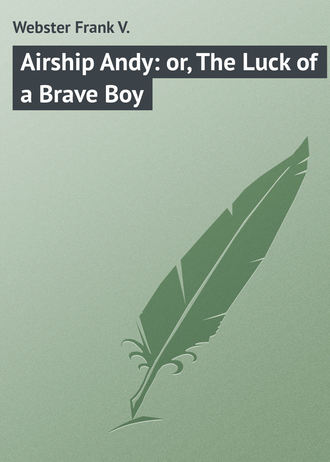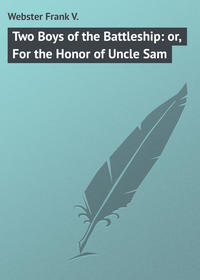 полная версия
полная версияAirship Andy: or, The Luck of a Brave Boy
Andy did so. As they entered the apartment indicated, a man with one arm in a sling advanced and grasped Andy’s hand warmly.
“This is a blazing shame!” he burst out, “but I’ll have you out of here if it takes all I’ve got and can beg or borrow.”
It was Andy’s employer, John Parks, the Airship King.
CHAPTER XVIII – OUT ON BAIL
Andy’s heart warmed up and he felt that the tide was turning. Parks was an energetic, impulsive man, and generally put through what he started at. His hearty greeting showed what he thought of Andy and the charge against him.
“Is that the sheriff coming?” he demanded impatiently of the officer or guard at the door of the room.
“He’ll be here soon,” was the reply, “we have sent for him.”
“Come over here, Andy,” directed the aeronaut, leading the way to a corner of the apartment so the others could not overhear their conversation. “I want to talk with you. Now then,” he continued, as they were seated by themselves, “tell me the whole story.”
“I wish I had done it before,” began Andy, and then he recited his experience with Talbot and the details of the barn burning.
“Guesswork and spitework, eh? The whole business,” flared out Parks. “They haven’t a foot to stand on in court. I’ll see that you have the right kind of a lawyer when the case comes to trial. All I am anxious about is to get you back to camp double quick. You know the race takes place day after to-morrow.”
“Yes, I know it only too well,” replied Andy; “I’ve worried enough about it.”
“Here comes my man, I guess,” interrupted Parks, as a portly consequential-looking person entered the room.
“I wanted to see you about this young man,” explained Parks. “They’ve shut him up here on a false charge, and I want to get him out. He’s a trusted employee of mine, and I need him badly in my business.”
“You want to give bail, do you?” inquired the sheriff.
“Every dollar I’ve got, judge,” responded the aeronaut with emphasis, “so long as he gets free.”
“The bail is two thousand dollars, and I suppose you know the bondsman must qualify as a real estate owner in the county.”
“I’m not that, judge,” said Parks, “but I’ve got some money.” He pulled out a roll of bills. “I’ve got nigh onto one thousand dollars personal property, and I’m going to earn the aviation prize down at Montrose day after to-morrow.”
“Considerably up in the air, part of your schedule, eh?” remarked the sheriff, smiling, “I’m afraid we can’t accept you as a bondsman. Residence here as a real estate owner is absolutely necessary.”
“Why, do you think I would leave you in the lurch or a boy like Andy sneak away. No sir-ree! You can trust me, Mr. Sheriff.”
“I don’t doubt that, but the law is very strict.”
Parks paced the floor excitedly. He looked disappointed and bothered.
“I’ve got to do something – Andy has just got to be at the aviation meet day after to-morrow. I’ve got it! Say, suppose I could line up two thousand dollars through friends, in cash, mind you, couldn’t I hire some man in Princeville to go on the bond?”
“It is very often done,” acknowledged the sheriff.
“Then I’ll do it. Andy, I’ll be back here to-morrow. Mr. Sheriff, you can fix the papers for quick action. I’ll raise that two thousand dollars if I have to mortgage everything I’ve got. I’ve got some friends and I own a farm out West.”
“Just a word, Mr. Parks,” said Andy.
“What is it, lad?” inquired the aeronaut.
“I wish you would get word to a lawyer at Greenville, a Mr. West, about something. He expected to see me yesterday, and I was arrested before I could get to him.”
Andy explained about the advertisement and the lost pocketbook. Mr. Parks was very much impressed and interested over his story.
“Why, Andy,” he commented vigorously. “There’s something strange about all this.”
“There is probably something very important for the man who lost the pocketbook,” said Andy. “I don’t want the lawyer to think I fooled him.”
“Can you find the pocketbook, Andy?”
“Unless it has been removed from the place where it was three weeks ago, I am sure that I can.”
“H-m, this sets me thinking,” observed Parks. “I’ll see that the lawyer gets the message, Andy. I’ll be back here to-morrow.”
“Mr. Parks,” said Andy seriously, “I don’t think you had better try to raise the money. It will be harder than you think, and all this will take up your time and attention away from the airship race.”
“There won’t be any airship race for me if you are out of it, will there?” demanded Parks.
“Why not? You can surely find someone to take my place. It’s the Racing Star that is going to win the race, not the man at the lever. He’s got to keep his eyes open, but the machine is so far ahead of anything I’ve seen, that a careful, active pilot can hardly fail to win.”
Parks looked dubious and unconvinced.
“I’m going to get you out of here,” he maintained stubbornly, and, knowing the determined character of his employer, Andy went back to the lockup believing that he would keep his word.
“What’s the news, Andy?” inquired Chase eagerly.
“The best in the world, Mr. Chase,” replied Andy brightly.
“Are they going to let you out?”
“I hope so, soon.”
Andy had told Chase something about his circumstances, and now told him more, mentioning the airship race.
“I say, you shouldn’t miss that, should you, Andy?” excitedly proclaimed Chase. “I wish I could help you. I can in time. I have a good mind – ”
Chase paused mysteriously, and began stumping about in his usual abstracted, muttering way.
Andy sat down on a bench as there was a movement at the cell-room door.
“Here, give this man shelter for the night and something to eat,” ordered the turnkey. “Turn him out in the morning.”
“Hello!” spoke Chase, evidently recognizing a regular habitue of the place, “it’s you again, is it?”
“On my rounds, as usual,” grinned the newcomer, a harmless-looking, trampish fellow.
“Been in some other lockup, I suppose, since we saw you last?” insinuated Chase.
“No, Wandering Dick and I have been following a show. You see – ”
“Who? Say that again,” interrupted Chase excitedly.
“Wandering Dick.”
“Where is he now?”
“Three days ago I left him about fifty miles south of here.”
“Is he there now?”
“I think so. The show broke up and that threw me out, but Dick talked about staying around Linterville till he could panhandle it south for the winter.”
“See here,” said Chase, drawing out his pocketbook. “There’s a ten-dollar bill,” and he flipped over some bank notes.
“I see there is,” nodded the tramp wonderingly.
“I’ll start you out with a good breakfast and that money in the morning. I want you to find Dick, bring him here, and I’ll give you each as much more money when you do.”
The tramp looked puzzled, then suspicious, and then alarmed.
“See here,” he said, “what are you going to work on us, same old charge?”
“Not at all. I want Dick to answer a half dozen questions, that’s all, and then you are both! free to go.”
“Say, let me start to-night!” said the tramp eagerly.
“No, it’s too late,” replied Chase. “There’s no train until morning.”
Andy had overheard all this conversation. Wandering Dick was the name he had heard Chase speak once before, and he had coupled it with the suggestion that in some way Wandering Dick was concerned in the incident of Farmer Jones’ burned-down barn.
Andy slept in a good bed and got up early in the morning, believing that the new day would bring some developments of importance in the situation.
The tramp was started off by Chase, breakfast was over, and Chase had been let out by the turnkey into the main room. He came rushing back in a few minutes carrying an armful of towels for jail use.
“Andy,” he chuckled, throwing his load recklessly on a bench and slapping his young friend gleefully on the shoulder, “You’re free!”
CHAPTER XIX – A DISAPPOINTMENT
Andy was led into the office of the jail and up to the desk of the official who had registered his name the day before. This man opened a drawer and pushed a package before Andy and a receipt.
“See if your money is all right,” he directed, “and sign that receipt.”
“Going to give them back to me, are you?” said Andy brightly, feeling delighted at recovering his liberty. “They must have found out that I am innocent.”
“H-m! that’s to be determined later on.”
Andy looked questioningly about the room. Who had set him free? What did it mean? Just then he caught the sound of voices in another room and the officer pointed to it.
“Your friend is in there,” he said. “He’s waiting for you.”
Andy felt as if he had wings on his feet. His heart was overflowing with gladness. He crossed the threshold of the doorway the officer had indicated, looked in, and then stood stock still, very much surprised.
“Well, young man, we’ve reached you at last?” spoke a hearty voice.
“Why, it’s Mr. Webb!” exclaimed Andy.
He had at once recognized the gentleman whom he had driven over in the automobile from Princeville to Macon, the day when all his troubles in life seemed to have begun.
With Mr. Webb was a man who nodded pleasantly but curiously to Andy. This was Joshua Bird. He was reported to be the richest man in Princeville, and dealt principally in real estate and had the reputation of being something of a miser.
Mr. Webb, holding Andy’s hand, turned to Mr. Bird.
“Well, sir, everything is satisfactory?” he asked.
“Entirely so,” answered Bird. “You’re putting a good deal of faith in a lad you scarcely know, though.”
“I’ll bank on my confidence,” answered Mr. Webb. “Nelson, you remember me, do you not?”
“Perfectly, sir, but I don’t understand.”
“My being here?” questioned Mr. Webb. “A purely selfish motive is at the bottom of it, I am free to confess, although I am glad to be of service to you on general principles. Are you ready to leave here at once?”
“Where for, sir?”
“An automobile dash across the country.”
“And then am I to return here?”
“Not until your trial comes on. Let me explain, so you will understand the situation. I have gone on your bail bond.”
“I don’t know how to thank you,” said Andy gratefully.
“Your friend, Mr. Parks, found me late last night at Greenville, where Mr. West and myself were anxiously awaiting you. He explained about your arrest, and told us the whole story of your affairs. It seems that your trouble began with the finding of my pocketbook. It was only right, therefore, that I should stand by you – which I have done, and intend to keep up, Andy, for you have proven yourself a good, honest boy.”
“Thank you, Mr. Webb,” said our hero with considerable emotion.
“Mr. West, my legal adviser, arranged with Mr. Bird, who has just left us. The signing of your bail bond is the result. You are free to get to those anxious friends of yours at the aviation meet, but first I want you to take a little trip with me.”
“After that old leather pocketbook, I suppose.”
“You’ve guessed it right, Andy.”
“I would like to speak with a good friend of mine in the jail here for a moment,” said Andy, “and then I will be ready to go with you.”
“All right, Andy.”
Chase had already heard the good news and congratulated Andy, chuckling and hobbling about at a great rate.
“Remember you’re to look out for a new job for me,” he intimated.
“I’ll attend to that all right, Mr. Chase,” promised Andy. “If things go as I think they will, I have a friend as well as an employer who will probably need a man such as you to potter about and look after things.”
“Andy, I’ll potter for keeps if you get me that situation,” declared the old lockup-keeper earnestly. “You get it fixed for me, and when your trial comes up, I’ll show you how much I think of you.”
“Things are certainly coming out famously right,” chirped Andy gaily, as he left Chase.
“Now then, Nelson, take a try at my new machine,” said Mr. Webb, as he led Andy to the street.
Seth Talbot, one of his own machines waiting at the curb for a fare, was strolling around inspecting the beautiful touring car which Mr. Webb had indicated.
“Eh, hey! what’s this?” he blubbered out, as Andy walked smartly to the machine and leaped into the driver’s seat.
An officer who was aware of the situation nudged Talbot and spoke a few quick words to him in an undertone. The face of the garage owner turned white with astonishment and malice. Mr. Webb had noticed him, and asked Andy:
“Who is that man?”
“Mr. Talbot, my old employer,” responded Andy.
“I don’t like his looks,” spoke Mr. Webb simply. “Now then, Nelson, of course you know where I want to go.”
“After the leather pocketbook – yes, sir.”
“I hope you can find it.”
“I feel sure we shall, sir. We will have to take some roundabout roads to get to the farm I told Mr. West about.”
“This is a very important matter to me,” explained Mr. Webb. “I may as well tell you, Nelson, that the fortune and happiness of two orphan children, distant relatives of mine, depend on the finding of that old pocketbook.”
“I am very much interested, Mr. Webb,” said Andy.
“You did not notice perhaps, but glued down in the big part of that pocketbook is a thin compartment. Secreted in that is an old time-worn sheet of paper that I spent thousands of dollars and a year’s time in locating and getting into my possession. I was on my way to my lawyer with it, and had placed two hundred dollars in the pocketbook for costs in the law suit, when I lost the pocketbook, as you know.”
“I never dreamed there was any value in the old pocketbook,” said Andy. “I knew it was in my old clothes which I threw away at a farm near Wade, I told you about. I remember perfectly well tossing them up on an old shelf. Unless they have been disturbed, we will find the clothes and the pocketbook. It was a regular old rubbish pile where I tossed them, and out of anybody’s way.”
“I shall feel immensely relieved and glad when I find that document,” declared Mr. Webb, with a sigh of anxiety.
John Parks was responsible for bringing the word to Mr. West that had sent Mr. Webb to Princeville. The aeronaut had told the lawyer considerable about Andy and the approaching airship race, and as they rolled along Mr. Webb showed a great deal of interest in Andy’s aviation ambitions and asked a great many questions.
“I shall want to see you again as soon as I get that document in the pocketbook to the lawyers,” said the gentleman. “The airship race is to-morrow?”
“Yes, sir.”
“I will keep track of you through Mr. Parks, and probably meet you day after to-morrow. I hope you win the race, Nelson, and get the prize. You deserve it, my boy. If you fail, do not get discouraged. You have some good friends, and I am one of them.”
“You have shown that,” said Andy with feeling. “I wouldn’t have missed the race for a good deal.”
Andy entertained his companion considerably by a recital of his adventures three weeks previously when he had helped the goose farmer get his product to market.
“Just yonder is where I met him first,” explained Andy, as they passed over a bridge crossing the river. “It’s a straight road to the Collins farm now, but not very even.”
“I hope we find things as you expect,” said Mr. Webb.
“I think we will,” answered Andy cheerfully.
It was about an hour later when they rounded a curve in a beautiful country road.
“Just beyond that grove of trees,” said Andy, “and we come in full view of the Collins farmhouse. Now we can see it – Why, I – don’t – understand – this.”
Andy slowed down in speech, with a series of wondering gasps, as he likewise slowed down the machine.
“Why, what’s the matter, Nelson?” queried Mr. Webb.
“Don’t you see?” began Andy. “No, you don’t see, and that’s just it. There’s something wrong. The farmhouse did stand right over where that gravelled road runs into the farm, and now – ”
“Nelson,” interrupted Mr. Webb almost sharply, “there has been a fire here.”
Andy stared dubiously, but in great concern. There could be no doubt of it, this was the site of the Collins’ farm. There were the white-washed posts where the farm road began, the horse block where he bade the goose farmer good-by, but the farmhouse itself had disappeared.
CHAPTER XX – A NEW CAPTIVITY
“Nelson, could you possibly be mistaken?”
“No, sir, positively not.”
Andy had come to a dead stop with the automobile. He stared blankly at the prospect before them. The site of the Collins farmhouse was a flat stretch of waste and ruin. Grass, weeds, trees, fences showed the ravages of a great fire.
Mr. Webb looked dreadfully disappointed. His face had become almost pale. Andy shared his disquietude, but he could simply say:
“I am very sorry.”
“You did all you could, Nelson,” responded his companion. “Here comes some one. We will question him a little.”
A farm laborer with a hoe across his shoulder sauntered down the road. Andy hailed him. As he came nearer to them Mr. Webb said:
“My man, what has been happening around here?”
“Don’t you see?” queried the man, with a comprehensive wave of his hand across the bleak ruins. “Fire.”
“This is the Collins farm, isn’t it?”
“It was,” answered the man. “The fire took them in the night a week ago.”
“And burned everything about the place?”
“Down to the pig styes.”
“Where are the Collins people?”
“Gone over into Bowen County until they can arrange to build again.”
“Start up, Nelson,” ordered Mr. Webb. “It’s a waste of time to loiter around here.”
Mr. Webb felt cruelly disappointed. Andy saw this and was sorry for him. He glanced at the spot where he remembered the old shed to have stood. Even the tree that had sheltered it had burned to a crisp.
“Where am I to go?” inquired Andy.
“You had better strike for Rushville,” replied Mr. Webb. “From what I remember, you can get a train to Montrose earlier than on the Central.”
“I am to go on to John Parks?”
“That’s the programme,” said Mr. Webb, trying to appear cheerful; “why not?”
Andy reflected seriously for a moment or two. Finally he spoke:
“Mr. Webb,” he said; “I hardly feel right to leave you on my bond for that big amount. Something might happen so that I could not appear for trial – trickery, or a dozen things.”
“And because you have not succeeded in recovering that pocketbook, you suppose I’m going to desert you, Nelson?” inquired the gentleman.
“You are not the man to do a single mean thing,” replied Andy, “but, with all your troubles, and me being a stranger – ”
“Drop it, Nelson. You have tried to be the best friend in the world to me, and I’d go on your bond for double the amount I have. You are to go straight on to Montrose, win that airship race, and when you have got that off your mind we will have a talk together.”
“You are a good, kind man,” said Andy, with fervor, “and I’d walk barefooted on hot coals to get you back that pocketbook.”
When they reached Rushville, Mr. Webb took charge of the automobile. He made many encouraging references to the coming airship race, and when he left Andy at the railroad station shook his hand in a friendly way.
Andy made a disappointing discovery as soon as he consulted the train schedules. A change in the service of the road had been made only that week, and there was no train south until seven o’clock. It was now three, and he would have to wait four hours.
“I won’t be able to get home until after dark,” reflected the lad. “I hoped to have an hour or two of daylight for practice, but this knocks my plans awry. Well, as it is, this is a good deal better than missing the race altogether.”
It was quite dark when the train reached the limits of Montrose. It stopped at a crossing, and Andy got off and made a short cut for the Parks camp.
His course led him past the large aviation field. Andy was anxious to report to Mr. Parks as soon as possible, but unusual light and animation about the big enclosure aroused his curiosity and interest, and he passed the gate and strolled by the various aerodromes.
Everything was “the race!” Groups were discussing it, contestants were oiling up their machines and exploiting the merits of the others. An hour passed by before Andy realized it. He came to halt in front of the last tent in the row, turned to retrace his steps, and then suddenly halted.
“I’d like to know what the Duske crowd is about,” he reflected, glancing towards the isolated camp which he had surreptitiously visited only a few nights previous. “Mr. Parks might be glad to know, too. I’ll do a little skirmishing and find out what I can.”
Andy crossed a dark space. Lights were moving about the Duske camp, and these served as a guide. He neared the fence surrounding the camp, got over it, and cautiously approached the large tent which held the airship he had inspected on his first stealthy visit to the place.
Suddenly Andy tripped and fell. His foot had caught in a wire stretched taut under the grass. As he went headlong across the grass, a bell began to jingle, and he realized that the wire was one of many probably set to trap intruders. At all events, before he could get to his feet two men ran out of the tent.
One of these was Duske. The other was his companion of the evening when Andy had previously visited the place. They pounced on him promptly.
“Another spy,” spoke Duske, dragging the captive toward the tent.
“They’re getting thick,” observed his companion. “Those fellows at the big camp are mighty curious to pry into the secrets of our craft here. Hello! why, Duske, this is the same fellow we caught snooping around here three nights since.”
“Eh? Oh, it’s you again, is it?”
They had come inside the tent. The light burning there revealed Andy fully. Without letting go of him Duske scowlingly surveyed his captive.
“Say, Duske,” spoke the other man quickly, “it’s Parks’ boy, and he’s the one who won the pony prize.”
“Was that you?” demanded Duske; “are you Andy Nelson?”
“Suppose so?” queried Andy.
“Then you’re the fellow who is going to take Parks’ place in the race to-morrow?”
“I guess that is right,” affirmed Andy.
“No,” cried Duske, showing his teeth, and looking fierce and malicious, “it’s wrong, dead wrong, as you’re going to find out. Fetch me some rope.”
“Hold on,” objected Andy, “you aren’t going to tie me up?”
He put up a manful struggle and very nearly got away. The two powerful men were more than his equal, however, and in a very few minutes Andy found himself tied hand and foot.
Duske and his companion carried him bodily along through the tent, past the flying machine, and threw him onto a mattress lying on the ground in a small compartment partitioned off with canvas. Duske tested the ropes that bound Andy, gave them another twist, and went out into the main tent.
“This looks like luck,” observed the companion of Duske.
“Yes, if we’ve got the bearings right,” replied the other, “Are you sure he was scheduled to take Parks’ place in the race?”
“Of course I am. Hasn’t Tyrrell told us already about his getting into trouble somewhere, and couldn’t be here to make the race? Hasn’t Parks hired Tyrrell in his place?”
“Then how comes the boy to be here? I don’t like the looks of things at all.”
“Tyrrell will be here before long. He can post us if there is any break in our arrangements.”
The two men passed out of hearing. Andy made one or two efforts to loosen his bonds, found them unusually secure, and gave up the experiment. What his captors had said startled and disturbed him considerably.
“Mr. Parks doesn’t expect me to show up in time to make the race, and this man they talked about, Tyrrell, is going to take my place,” reflected Andy. “He is a friend of the people here, and that certainly means harm for Mr. Parks.”
Andy worried himself a good deal during the next hour, imagining all kinds of plots on the part of Duske and his friends to prevent the Racing Star from winning the prize.
Finally Andy heard voices in the large tent. His name was spoken, and he listened intently to catch what was said.
“If that’s so, and it’s really Andy Nelson,” sounded a new voice, “it’s funny, for up to this morning he was in jail at Princeville.”






